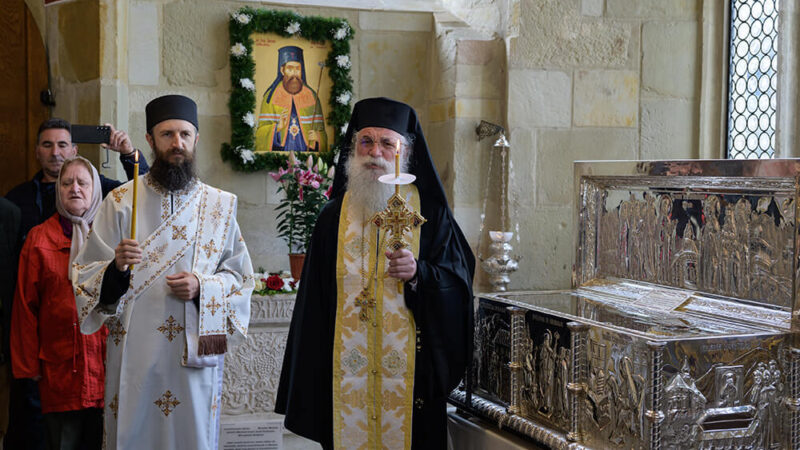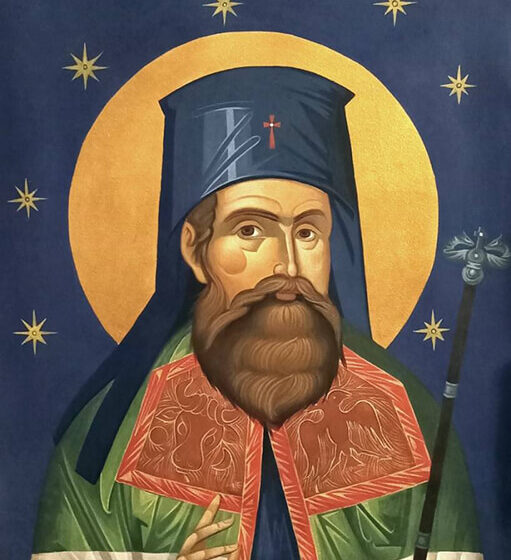
Cu darul lui Dumnezeu și prin bunăvoința Părintelui Stareț Melchisedec al Mănăstirii Putna, mănăstirea noastră s-a împodobit cu o particică din sfintele moaște ale Sfântului Iacob Putneanul. Așadar, prezentăm în continuare crâmpeie din viața și moștenirea duhovnicească a acestui mare sfânt.
Viața Sfântului
Luminarea poporului prin educație. Marele Mitropolit a dorit din toată inima ca poporul să meargă pe urmele lui Hristos. Hristos era viața Sfântului Iacob și această Viață voia să o dăruiască din belșug credincioșilor. De aceea, a lucrat neobosit ca sufletul poporului să fie luminat prin învățătură, să aibă parte de o educație care să îl înalțe spre cele sfinte, spre cele veșnice.
Unul dintre mijloacele de aflare a cuvântului lui Dumnezeu și de formare duhovnicească este cuvântul scris. Bucurându-se de hrana sufletului și a minții prin cărțile citite la Putna, a dorit ca această hrană să ajungă și la alți nevoitori și la cât mai mulți creștini, spre luminarea și mântuirea lor. Pentru aceasta, a rânduit să fie traduse și tipărite mai multe cărți.
În primul rând, a tipărit numeroase cărți necesare pentru buna rânduială a slujbelor. Acestea au fost traduse în limba română, pentru ca preoții să slujească în limba înțeleasă de popor.
De pe la sfârșitul veacului al XVII lea, în Moldova, a început să fie folosită limba română în Biserică. Principalul osârduitor în această privință a fost Sfântul Mitropolit Dosoftei. După aceasta, traducerea cărților de slujbă în limba română a stagnat. Sfântul Iacob Putneanul a reluat traducerea și a tipărit atât cărți de slujbă, cât și cărți cu învățăturile marilor părinți văzători de Dumnezeu, folositoare la deprinderea meșteșugului luptei duhovnicești. Pentru a înțelege cât de mult a sporit Sfântul Iacob numărul cărților de folos, trebuie spus că, între 1700 și 1750, au fost tipărite 66 de cărți în Țara Românească și doar 10 în Moldova, iar între 1750 și 1760, Sfântul Iacob a tipărit 15 cărți în Moldova.
Sfântul Iacob a avut un rol foarte important pentru dezvoltarea învățământului. Pentru a împlini nevoia de cărți după care să învețe copiii, Sfântul Iacob a tipărit, în 1755, primul abecedar din Moldova, Bucvarul. În prefața acestuia, Sfântul Iacob scrie cât de importantă este educația copiilor și cât de mare nevoie era de cărți pentru copii: „Cum dar vei nădăjdui de bine unde nu este hrană bună copiilor? Iar de hrană ca aceea în țara aceasta, cine nu vede câtă lipsă este?”
La propunerea Sfântului Iacob, prin hrisovul domnesc al lui Teodor Callimachi din 25 iunie 1759, s a înființat prima școală rurală din Moldova, pentru copiii satului Putna. În primele decenii de funcționare, Sfântul Iacob va încredința arhimandritului Vartolomei Mazereanu și altor călugări, ascultarea de a preda copiilor și de a purta grija întreținerii școlii. Până la mijlocul secolului al XIX lea, aici vor preda monahi putneni, apoi vor veni învățători laici. Școala funcționează, fără întrerupere, până în prezent.
Nu numai prin tipărirea Bucvarului și prin înființarea școlii din Putna și a arătat Sfântul Iacob grija pentru educarea copiilor, ci permanent îi îndemna pe credincioși spre aceasta. Fără învățătură, sufletul se usucă, scria el: „Învățătura este asemenea cu florile cele mirositoare, iar cel neînvățat este asemenea copacului celui uscat”.
Râvna sa pentru educație se datora înțelegerii pe care o avea despre rostul educației. Sfântul Iacob a înțeles că lumea și frumusețea ei sunt daruri de la Dumnezeu pentru om. Iar omul, prin frumusețea și sensul celor văzute, este chemat să înțeleagă frumusețea și realitatea celor nevăzute.
Educația deschide ochii pentru a înțelege firea acestei lumi, pentru a înțelege rostul fiecărui lucru și dreapta lui folosire, rostul fiecărui om și dreapta legătură cu ceilalți oameni. Cunoscând lucrările lui Dumnezeu, omul află despre El și despre dragostea Sa pentru om, pentru care a făcut toate. Și astfel, folosind după voia lui Dumnezeu cele văzute, omul se înălță către cele duhovnicești, nevăzute. Așadar, pentru Sfântul Iacob, educația este o cale pentru dobândirea vieții veșnice.
De aceea, ca părinte sufletesc și ca ierarh responsabil cu educația în țară, el a urmărit ca prin aceasta să se formeze fii ai Împărăției cerurilor. Având în fața ochilor acest rost, Sfântul Iacob, împreună cu colaboratorii săi au făcut eforturi mari, continue, și au înscris câte o pagină importantă în istoria educației și în istoria culturii românești.
Sfântul Iacob a dorit să arate poporului modele de desăvârșire – sfinții. De aceea, a rânduit să fie traduse Viețile sfinților, adevărate manuale în care orice om, de orice vârstă, fire și statut, își poate afla un model de viață. La îndemnul lui, s au tradus, deși fără a fi reușit să le publice, 6 dintre cele 12 volume ale Vieților sfinților, pe lunile septembrie, octombrie, noiembrie, martie, aprilie și mai. Nu doar acestea, ci, din păcate, și alte cărți, pe care el a rânduit să fie traduse, au rămas în manuscris, în urma retragerii sale din scaunul de mitropolit. (Va urma)
L-am simțit pe Sfântul Iacob Putneanul ca o prezență smerită și permanentă
Răzvan s-a îmbolnăvit de cancer la Sofia, în timpul unei burse de studii. Aflase că cea mai bună prietenă a lui s-a sinucis și, pentru că nu a putut îndura această durere, i s-a declanșat un cancer limfatic.
Cum ai ajuns să-l cunoști pe Sfântul Iacob?
În anul 2017, am fost diagnosticat cu limfom Hodgkin stadiul IV. Aceasta este denumirea oficială a unui cancer limfatic, care se răspândise și la plămâni, oase și timus într-un timp foarte scurt. Medicii au fost foarte sceptici în privința vindecării. Chiar o prietenă, care este medic la Spitalul Militar și care m-a ajutat, a zis că prognosticul de viață mai este de maxim două luni. Atât au dat oamenii.

Mie nu mi s-a spus inițial de situația mea. Medicii de la spital au încercat să mă ferească de a ști că de fapt, eu sunt în ultimul stadiu și îmi spuneau că sunt în stadii incipiente, dar medicul curant îmi zice la un moment dat: „Bănuiesc că știți în ce stadiu sunteți, știți că este stadiul IV”. Și atunci a fost o lovitură pentru mine. Era ultimul stadiu, metastaza. Și atunci, am început să plâng. Am plâns câteva minute și m-am simțit ca și cum mi s-a distrus tot viitorul, lumea, toate planurile, năzuințele. Cum rezolv problema? Trebuie să fac ceva. Am început să sun preoți și nimeni nu îmi răspundea la telefon, căci doream să vină cineva să mă împărtășească. Într-un final, am dat de părintele stareț de la Radu Vodă, mi-a trimis un preot, m-am împărtășit și din clipa aceea nu am mai avut absolut nicio frică. Am privit cu nădejde.
În acel an, chiar de aducerea moaștelor Sfântului Ierarh Nicolae la Bari, pe 9 mai, am început citostaticele, iar când a avut loc canonizarea Sfântului Iacob Putneanul, am urmărit-o la televizor. Eu nu știam foarte multe date despre viața Sfântului Iacob, doar chestiuni istorice, nu referitoare la sfințenia lui. Dar în ziua canonizării sfântului, când i s-a cântat troparul, am simțit o emoție deosebită. Urmăream de acasă. Aveam metastaze osoase, niște dureri cumplite numai când mă mișcam, nu mai zic când mergeam la baie. Și stând în pat și urmărind slujba de canonizare, când s-a intonat troparul sfântului, am simțit acea emoție deosebită, care a iradiat din inimă în tot corpul. O bucurie deosebită pe care nu știu cum să o exprim. Este o chestiune extrem de personală.
Având acest sentiment, de fiecare dată când începeam citostaticele, cântam în mintea mea troparul icoanei Maicii Domnului Pantanassa, apoi cel al Sfântului Iacob Putneanul și simțeam ca și cum aș fi fost învăluit într-o mreajă și cineva mă elibera de mreaja aceea. Și de aceea spun că eu l-am simțit mereu pe Sfântul Iacob ca o prezență smerită și permanentă, alături de mine. Și exact același lucru am simțit la un an după ce m-am vindecat. Dar eu am continuat să mă rog și după ce s-a încheiat totul, adică după ce m-am vindecat.
Cât timp ai făcut citostaticele?
Aproape un an de zile, 24 de ședințe, apoi am urmat un tratament de radioterapie de 15 ședințe, pe care l-am încheiat în martie 2018.
În august am vorbit cu niște prieteni din Cehia și i-am adus la Putna. Când am intrat pe ușa bisericii mari, eu nu știam că Sfântul Iacob fusese înmormântat chiar în partea stângă. Deci, când am intrat pe ușă în pridvor, exact unde e mormântul Sfântului Iacob, am simțit exact același lucru și aceeași prezență. Și atunci m-am întors în partea stângă și am văzut icoana sfântului. Pe mine deja mă bufnise așa un plâns și încercam să mă strecor cumva. Nici nu voiam să pară ciudat, pentru că eram cu prietenii din Cehia care nu erau ortodocși. Dar m-a luat pe nepregătite, m-a surprins. Apoi, când am ajuns în paraclis, exact aceeași prezență, același duh, așa cum am simțit acasă când i-am ascultat prima dată troparul.
După momentul de acasă cu troparul, au mai fost momente deosebite?
Desigur. Începeam citostaticele. Eram întins în pat. Venea asistenta să-mi introducă substanța citostatică. Și tot timpul făceam Sfânta Cruce, apoi cântam către Maica Domnului în minte și către Sfântul Iacob. Și aveam simțământul acela de eliberare, care era atât de odihnitor. Și vă spun că nu mi-a fost rău. Medicii s-au mirat, pentru că eu făceam câte șapte feluri de citostatice, câte 3 litri și jumătate de substanță citostatică. Medicul curant s-a mirat și i-a spus și mamei că: „Eu nu sunt de acord cu acest tratament, dar nu am altceva ce să-i administrez; dacă nu încercăm așa, sigur o să moară”. Și s-a mirat pentru că se aștepta la stări foarte puternice de greață, de tot felul. Dar la mine nimic. O singură dată am avut febră 40 de grade. Dar, în general, nu am avut stări de rău. Toată lumea s-a minunat.
Dumnezeu m-a salvat, prin Sfântul Iacob, și îi sunt recunoscător sfântului și îl am la mare cinste. Pentru mine, ziua de prăznuire a sfântului e ca o zi de Înviere.
Cum îl simțiți pe Sfântul Iacob acum?
La fel ca întotdeauna. Este exact aceeași prezență minunată, tainică, smerită. Este un sentiment de ușurare, de liniște. Mă simt odihnit. Cred că este un sfânt făcător de minuni al zilelor noastre, pe care Dumnezeu ni l-a descoperit și ni l-a dat ca să ne folosim.
